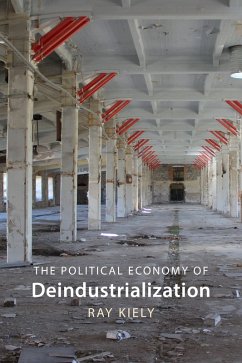
Industrial Policy (eBook, ePUB)
Versandkostenfrei!
Sofort per Download lieferbar
25,95 €
inkl. MwSt.
Weitere Ausgaben:

PAYBACK Punkte
13 °P sammeln!
Well-designed industrial policies can improve a nation's economic performance. Using a range of tools, such as subsidies, tax incentives, infrastructure development, protective regulations, and R&D support, governments are able to support specific industries or economic activities.Steve Coulter examines the patterns of industrial policymaking across late capitalist societies. Drawing on case studies from a range of countries, each with different growth models, national capabilities, policy traditions, and political/welfare state regimes, he is able to offer a nuanced comparative assessment of ...
Well-designed industrial policies can improve a nation's economic performance. Using a range of tools, such as subsidies, tax incentives, infrastructure development, protective regulations, and R&D support, governments are able to support specific industries or economic activities.
Steve Coulter examines the patterns of industrial policymaking across late capitalist societies. Drawing on case studies from a range of countries, each with different growth models, national capabilities, policy traditions, and political/welfare state regimes, he is able to offer a nuanced comparative assessment of states' responses to specific economic challenges. The book draws broad conclusions about the trajectories of industrial policy and highlights key technical and political drivers that policymakers consider when addressing whether best practice should centre on general or nationally-specific approaches. The book also focuses on fresh challenges and opportunities for industrial policy and questions the sustainability of current policy practice.
Steve Coulter examines the patterns of industrial policymaking across late capitalist societies. Drawing on case studies from a range of countries, each with different growth models, national capabilities, policy traditions, and political/welfare state regimes, he is able to offer a nuanced comparative assessment of states' responses to specific economic challenges. The book draws broad conclusions about the trajectories of industrial policy and highlights key technical and political drivers that policymakers consider when addressing whether best practice should centre on general or nationally-specific approaches. The book also focuses on fresh challenges and opportunities for industrial policy and questions the sustainability of current policy practice.
Dieser Download kann aus rechtlichen Gründen nur mit Rechnungsadresse in A, D ausgeliefert werden.













